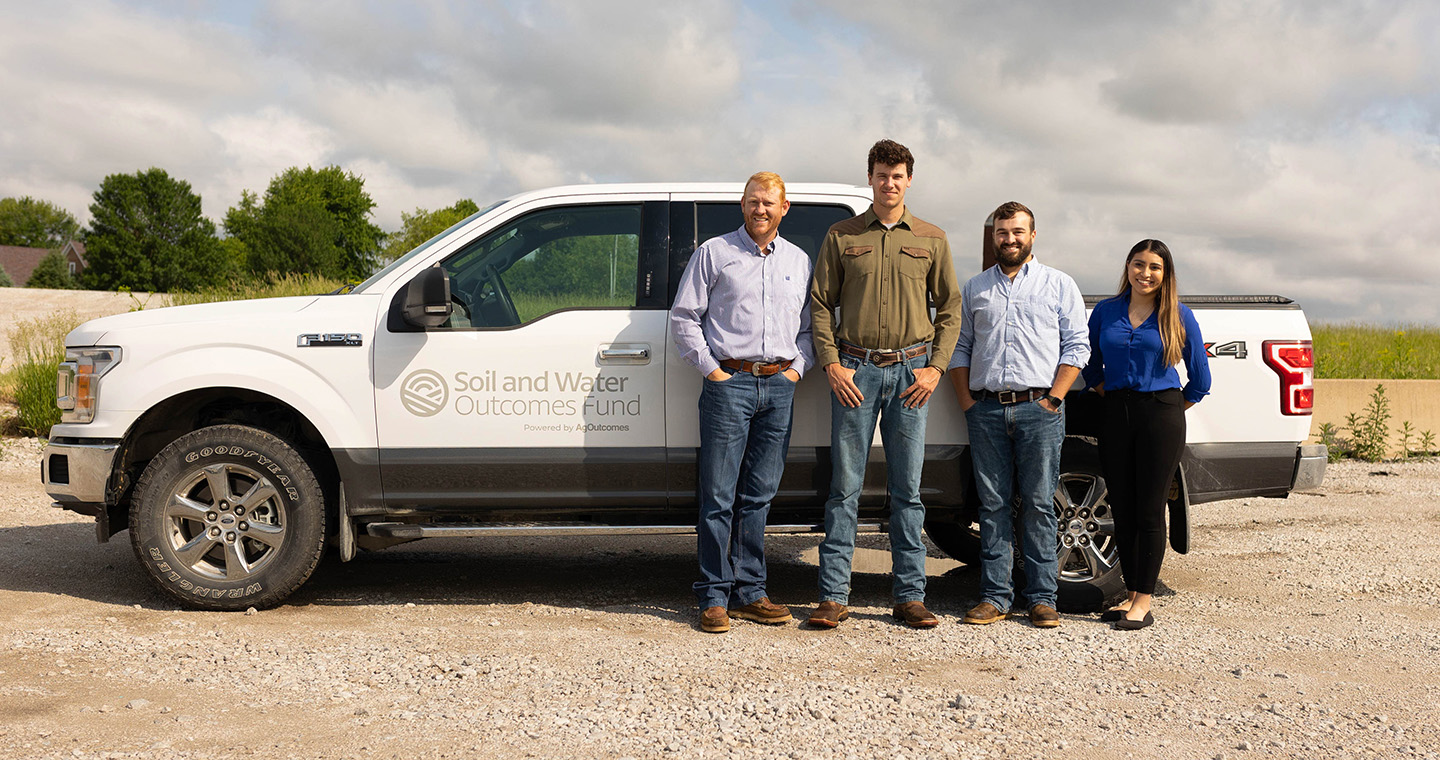
(Photo: Joclyn Bushman/Iowa Soybean Association)
Fast 4: Find out which ISA-related projects earned Climate-Smart Commodities grants
September 15, 2022
The USDA announced Wednesday an investment of $2.8 billion in 70 projects as part of the first Partnerships for Climate-Smart Commodities and the Iowa Soybean Association (ISA) is involved. The projects are expected to remove more than 50 million metric tons of carbon dioxide during their lifespan and there are four ISA-related projects which will make a difference.
“In addition to the Midwest Climate-Smart Commodity project funding that ISA will serve as the overall project lead, ISA is also excited to partner with others on three additional important projects,” says ISA CEO Kirk Leeds. “ISA has more than 20 years of experience in leading and partnering with others in efforts to assist farmers in implementing climate-smart practices in order to improve environmental and agronomic performance. These additional dollars will enable us to greatly expand our efforts.”
ISA Research Center for Farming Innovation (RCFI) Co-Director Roger Wolf says RCFI will be actively engaging in several of the projects in Iowa, with their significant long-term research on practices and conservation agronomist staff being leveraged to help the projects be successful.
"ISA will be assisting with outreach efforts building awareness and understanding of the benefits of doing this work," says Wolf. "We anticipate the conservation agronomist positions, which are part of the ISA RCFI Conservation Agronomist Network serve as 'boots on the ground,' providing technical assistance directly to farmers helping them enroll in the various programs and assist farmers successful adopt the practices. We also anticipate assisting with and supporting monitoring, data collection and verification to help document the environmental and agronomic outcomes of using climate smart practices.
He continues, "Recognizing ongoing and long-term need to dramatically scale-up farmer’s practice adoption across the Iowa landscape, the new Climate-Smart Commodity projects will add significant technical and financial assistance directly to implement combinations of practices. This is important as farmers are dealing with more intense wet and dry weather cycles, which directly impacts yields, and exacerbates soil erosion and nutrient losses. The outcomes derived by the CSC practices will help soybean production be more resilient and sustainable."
1. Midwest Climate-Smart Commodity Program
The project:
The Midwest Climate-Smart Commodity program is a five-year program which will provide direct financial incentives for farmers operating in Iowa and 11 other states to implement on-farm practices resulting in positive environmental outcomes.
In addition to supporting farmers, funding will also be used for farmer enrollment and technical assistance, as well as outcome quantification, measurement, reporting and verification. The project will produce real world data on the costs and benefits of implementation to farmers and the environment and support the development of markets for climate-smart commodities.
The ISA Connection:
The Iowa Soybean Association is the lead partner for this project, which will be administered by the Soil and Water Outcomes Fund.
SWOF is a partnership of ISA's wholly-owned subsidiary AgOutcomes and ReHarvest Partners, first launched in 2020.
The fund compensates farmers for positive environmental outcomes brought about by the conservation practices implemented on their farms which are independently measured, verified and sold to customers.
Fast Fact:
- This project is tied for the highest overall funding ceiling out of all 70 projects at $95,000,000
2. Horizon II: A Climate-Smart Future for Corn, Soybean, Livestock, and Renewable Natural Gas Production
The project:
This five-year pilot project will be located in Iowa and Missouri and focuses on reducing greenhouse gas emissions, improving carbon sequestration in the production of corn, soybeans, pork and beef commodities as well as create opportunities for small and underserved producers while benefiting soil health, clean water, flood control and habitats for native wildlife.
Horizon II compensates farmers, livestock producers and landowners for GHG reduction and carbon sequestration in the soil through an outcomes-based carbon credit program. Cover cropping and grassland restoration is also incentivized through a market-based program supporting renewable natural gas production through anaerobic digestion of herbaceous biomass combined with manure.
The ISA Connection:
ISA serves as one of 13 major partners for the project, alongside SWOF; and ISA-affiliate Iowa Agriculture Water Alliance.
“We are thrilled to partner with ISA, the Soil and Water Outcomes Fund, Iowa Pork, Iowa Corn, Roeslein Alternative Energy, Iowa State University and others on this transformational project that will drive adoption of prairie strips and cover crops; create clean, renewable natural gas; improve water quality, address climate change and improve America’s energy independence,” says Sean McMahon, Executive Director of the Iowa Agriculture Water Alliance.
Fast Fact:
- This project occupies three of the 10 commodity categories which define these first 70 Partnerships for Climate-Smart Commodities projects
3. U.S. Climate-Smart Cotton Program
The project:
The U.S. Climate-Smart Cotton Program will build markets for climate-smart cotton and provide technical and financial assistance to more than 1,000 U.S. cotton farmers to advance adoption of climate smart practices on more than one million acres. This will allow the production of more than four million bales of Climate-Smart Cotton over five years.
The ISA Connection:
SWOF serves as one of the nine major partners for the project.
Fast Fact:
- Cotton has a long growing season for an annually planted crop — approximately 150 to 180 days.
4. National Pork Board's Advancing U.S. Pork Sustainability and Market Value Proposal
The project:
The proposal aims to increase the sustainability of U.S. pork products by advancing climate-smart agriculture practices within the feed supply, maintaining market demand and price premiums in the process. The proposal focuses on Minnesota, Iowa and Missouri, a key area of the supply chain featuring a concentration of pork facilities supported by local grain production.
The ISA Connection:
ISA expressed formal support for the grant proposal.
Fast Fact:
- Every pound of U.S. pork exported represents the utilization of about 0.91 pounds of U.S. soybean meal
ISA Public Relations Manager Brock Johnston and the USDA contributed to this article.
Back